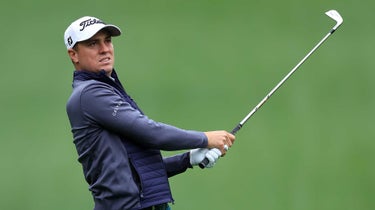
The self-imposed pressure was overwhelming, so here’s why I took a break from playing golf for three weeks.
Instagram/ndimengo
Welcome to Shaving Strokes, a new GOLF.com series in which we’re sharing improvements, learnings and takeaways from amateur golfers just like you — including some of the speed bumps and challenges they faced along the way.
Before diving into my reasons for taking a break from golf, let me start with this caveat: I have the best job in the entire world. No, I’m not writing that to appease investors or the so-called higher ups here at GOLF Magazine. It’s just truly how I feel.
But here’s the issue with the role that I’m in as the Instruction Editor: Once someone finds out my job title, they immediately think I’m a scratch golfer, ignoring all the shanks they saw me hit on the range or the thinned chips around the practice green.
Here’s a recent example.
Earlier this year, my buddy and I joined a random twosome for nine holes. The usual chit-chat ensued, with the icebreakers being your typical, “so, how often do you play here?” and the always reliable self-deprecating joke about some bad tee shot. If you play a lot of golf, you know exactly what I’m referring to.
By the time we reached 4th hole, the conversation turned to work, with the guys asking what my buddy and I do.
“Oh, I work at Starbucks as a Data Engineer,” my friend replied. “Nothing all that exciting, but it pays the bills!”
I hesitantly responded to the question, saying, “I actually work at GOLF Magazine; I’m the Instruction Editor there. So, yeah, I basically get paid to play golf.”
Throwing the awkward humor in there felt necessary, just to try and downplay the whole thing — especially since I had just sliced the hell out of my drive and was on my way towards digging through the weeds to retrieve it.
Unfortunately, the damage was done, and the gleam in the eyes of both guys was evident; they were now going to be paying much closer attention to each one of my shots. Not only comparing their own against the so-called Instruction expert, but also asking for tips on tips on tips.
Look, I’m always game for the latter, and really love helping other players when I can. But, again, I’m not a professional golfer. I’m not even a scratch golfer. I’m just a 13-handicap trying to get better at his game like you are.
So when it comes to questions about game-improvement, I always divert to people like our GOLF Top 100 Teachers rather than just giving my first-person advice. Trust me, everyone’s better off that way.
Anyway, as we played the rest of the round, every shot felt as if I was playing the 18th at a major championship. There was added pressure, with all eyeballs watching my every move.
One guy asked, “Wait, why’d you use your 60-degree from there?”
The other walked all the way up to the green with me after I hit a 9-iron from about 130 yards out, asking questions along the way until, finally, I reminded him I needed to read the putt before actually hitting it.
Look, I’m very aware that this sounds very much like “woe is me,” but it’s far from it.
I just think it’s important to remind everyone, especially amateurs or newer golfers, that the game really can chew you up and spit you out. When it does, it can be ugly — and crippling.
So I needed to hit the reset button, removing all expectations.
Taking a break from golf: Why I made the decision to step away for three weeks
As the headline states, over the past few months, golf began to feel overwhelming — and it was negatively impacting how I played.
There was the new pressure of being the Instruction Editor at GOLF, and having everyone think I had the answers to all of their golf questions. There was excitement regarding my own game and improvement potential, knowing I have access to the top teachers and information in the golf world. Then there was my goal of breaking 80 by the end of summer, thinking that the more I played, the better I’d get.
In mid-June, it all came crashing down. The honeymoon was over, and I was burnt out, leading me to take a break for three weeks. This is what I learned.
I couldn’t handle my own expectations
I’ve been a 13-handicap for about nine months now, which overlaps with late-fall or winter when I didn’t play a whole lot. Yet once I signed the dotted line to take the job with GOLF, I instantly thought I’d see accelerated improvements in my game.
Disclaimer: It hasn’t happened that way.
Sure, I’ve spent more time working on my game than I ever have — taking my first-ever golf lesson, getting fitted for new clubs, and talking with the top golf teachers on the planet — but I expected to have shaved off numerous strokes by now, helping me get closer to my goal of breaking 80 by the end of summer.
Instead, I’ve just now started to discover some bad golf habits that have been in my game for years, and I couldn’t accept that as progress unless I saw lower scores.
I had information overload
Too many voices isn’t always a good thing — and they led to my mental state being an absolute wreck.
Instead of confidently stepping over my ball and trusting myself, I had hundreds of different swing thoughts. From worrying about my setup to doubting my alignment to consciously overswinging while I was in my backswing, I was trying to take all the information I write about each day and put it into one golf swing.
I just couldn’t get comfortable with a club in my hand, which, you know, is a big problem when you’re playing golf.
It got so bad that, during a session in a golf simulator last month, I actually laid my driver down on the ground, took a step back, and just sat there wondering why I had hit off the heel 8 shots in a row, never once hitting a shot past 197 yards — with a driver!
That moment was probably the lowest point I’ve ever felt in my 26 years of playing. I had no answers.
When I say I was down bad, I mean it.
I was always “on” and couldn’t turn off my competitiveness
Masters champ Jon Rahm once described himself as being someone who has “golf on my mind 24/7.” For the past six months, I could relate.
Anytime I had a free moment, I was in the proverbial “lab,” putting in work to get better.
If I wasn’t playing a round or heading to the range, I was using numerous training aids around my house or asking my wife to analyze my swing, simulating the motion without a club in our kitchen.
Being “locked in” all the time was terrible for my mental health.
I began dreaming about golf. I’d even anxiously wake up in the middle of the night prior to a round, antsy about how I’d shoot.
When I decided to take a break from golf, I rediscovered some of my other hobbies (like running), and had to really monitor how much I thought about golf outside of work.
As I ease back into playing again, I’m using Rahm’s advice after he took some mental time off a few years ago.
“I took the first two weeks off, completely off of golf,” he said. “I still went to the gym and worked out just because it’s more of a mental thing. Then I slowly just started playing some games with my friend and then practicing. But the first month wasn’t very intense. I was there, wanted to be there with my family.”
I began counting strokes backwards from 80
As mentioned, my goal is to break 80 for the first time ever by the end of summer. However, prior to taking a break from golf, I didn’t have any patience or mental fortitude to accomplish it.
I’d by five over after three holes and immediately get upset with myself, counting down how many strokes I had left to break 80. I’d do quick math on the scorecard to figure out what I had to shoot on each remaining hole to reach my goal.
Naturally, it took the fun out of the game for me.
Between all the swing thoughts, my impatience, and my competitiveness, it was time to put the clubs away and just r-e-l-a-x.
Taking a break from golf wasn’t just a choice, it was a prescription to get my mind right — and I’m hoping it gets me back on track, helping me enjoy the game again.
We all want to shave strokes as fast as we can and see improvements. But there’s no cutting corners in the game of golf, and there’s always uncontrollables that impact your scorecard.
In golf, we typically only celebrate victories in terms of low scores. But my time away is a win for me, and I think it’ll pay off in the end.
So if you’re feeling frustrated or down about where your game is, don’t be afraid to take a mental break and relieve yourself for a bit. As I’m starting to see now, the game will always be there — and a little downtime can help you reset yourself.












